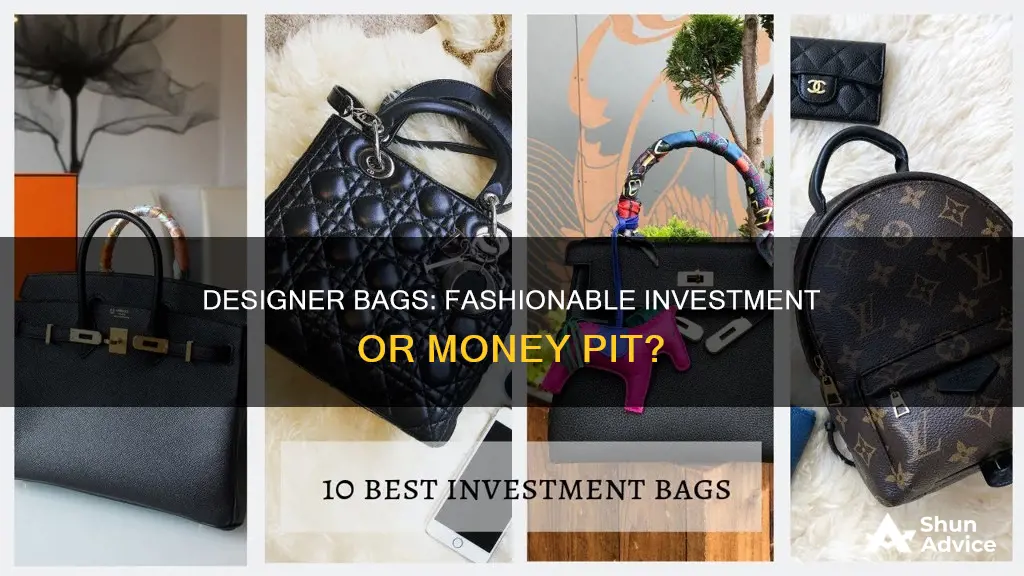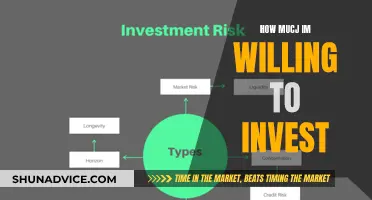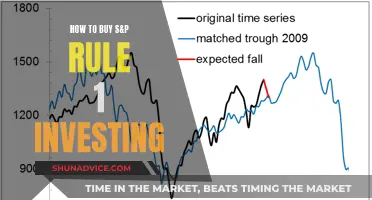
There is a lot of debate about whether buying designer bags is a good investment. Some people claim that certain designer bags are a better investment than stocks or gold, with a steady increase in value over time. However, others argue that the chances of designer bags holding their value are very slim, and that they are not a good financial investment.
So, what's the verdict? Well, it seems that the key difference lies in the definition of investment. If we're talking purely from a financial perspective, then designer bags may not be the best option. They are subject to fashion trends, which can be unpredictable, and there is no guarantee that they will be in demand in the future. Additionally, the resale market for designer bags can be tricky to navigate, with high reseller fees and the risk of scams.
On the other hand, if we're talking about a wardrobe investment, then designer bags could be a worthwhile purchase. A well-made designer bag can last for many years and may be worth the money if you plan to use it often. However, it's important to do your research and consider your budget before taking the plunge.
What You'll Learn
- Designer bags can be a legitimate investment, outperforming rare artwork, cars, and whiskey
- The resale value of designer bags is increasing
- Designer bags are not easy to sell due to authenticity concerns and reseller fees
- Designer bags are a passion product, so even if their value goes down, you still have something you love
- Designer bags are not a great financial investment as they are unlikely to hold their value

Designer bags can be a legitimate investment, outperforming rare artwork, cars, and whiskey
The key to a successful investment in designer bags is to choose wisely. While not all designer bags are good investments, some bags have seen record resale prices in the past decade. The most coveted luxury handbag, the 'Himalayan Birkin' by Hermès, fetched HK$2.8 million (Dh1.31 million) back in 2016. Other Hermès bags, as well as Chanel and Louis Vuitton bags, have also seen their valuations spike by an average of 80% in the last ten years.
When considering a designer bag as an investment, it is important to keep in mind that not all bags will hold their value. Designer bags are subject to fashion trends and may go out of style, reducing their resale value. It is also important to keep the bag in pristine condition, as any signs of wear and tear will decrease its resale value. Additionally, there may be high reseller fees and insurance costs associated with selling designer bags, which can eat into profits.
Despite these considerations, investing in designer bags can be a prudent decision, as they can retain their value well in the resale market. The Birkin bag, for example, is expected to double in value in the next decade. When choosing a designer bag to invest in, it is advisable to research and invest in a used bag that holds its value or has provenance. This will ensure that the bag at least maintains its value and may even increase in value over time.
Smart Ways to Invest $200 Today
You may want to see also

The resale value of designer bags is increasing
The key to a designer bag's resale value is its ability to retain its initial retail value or even appreciate over time. Some bags, like the Telfar Shopping Bag, can double their original price. The Hermès Birkin Sellier, a designer "unicorn," has an average value retention of 103%, with the rare Birkin Sellier reaching 226%. The Chanel Deauville Tote has also climbed in resale value, now retaining 112% of its original price.
Limited drops and collaborations can also boost a bag's resale value. For example, the Louis Vuitton x NBA Ball in Basket Bag has a 147% average value retention. Mini editions, like the Louis Vuitton Speedy Mini HL Handbag, are excellent investments due to their limited quantities and high demand. Collaborations, like the Dior Daniel Arsham Double Zip Crossbody Pouch, are also smart investments as they are limited editions that often sell out.
When it comes to designer bags as investments, it's essential to choose wisely. While some bags may increase in value, others may not. It's crucial to consider the bag's brand, style, and demand in the resale market. Additionally, keeping the bag in pristine condition is vital to maintaining its resale value.
The HELOC Dilemma: To Pay or To Invest?
You may want to see also

Designer bags are not easy to sell due to authenticity concerns and reseller fees
Firstly, proving authenticity can be difficult, especially if the bag was purchased directly from the brand's store. As a result, individuals looking to resell their bags may need to provide paperwork and receipts to establish authenticity. This can be a cumbersome and time-consuming process.
Additionally, reseller fees can take a significant chunk out of the selling price. Consignment services typically charge commissions ranging from 15% to 40% of the sales price. This means that sellers may end up making less money than they expected, even after paying high prices for their designer bags.
Furthermore, designer bags that have been heavily used or not properly stored may show signs of wear and tear, diminishing their resale value. Keeping these bags in pristine condition can be challenging and may require additional expenses for insurance and storage.
Another factor to consider is the demand for specific bag styles and sizes. While certain classic brands like Hermes, Chanel, Goyard, and Louis Vuitton may hold their value over time, there is no guarantee that a particular bag style or size will remain desirable in the future.
Lastly, the resale market for designer bags can be unpredictable. It may take weeks or even months to find a buyer willing to pay the desired price, especially if the bag is not considered trendy or in fashion at the time of resale.
In conclusion, while designer bags may be viewed as a good investment by some, they can be challenging to sell due to concerns about authenticity, high reseller fees, and the unpredictable nature of the resale market.
CYS Investments Inc: Dividend Payment Expectations
You may want to see also

Designer bags are a passion product, so even if their value goes down, you still have something you love
When considering a designer bag as an investment, it's crucial to understand the difference between a wardrobe investment and a financial investment. A wardrobe investment refers to a high-quality, desirable bag that you intend to use and enjoy over the long term. On the other hand, a financial investment involves putting your money in places where it can grow and create wealth for you over time. While some designer bags, such as those from Hermès, Chanel, or Louis Vuitton, may increase in value, the majority of designer handbags are not great financial investments.
One of the main reasons is that fashion trends are constantly changing, and what's in style today may be out of fashion tomorrow. Additionally, the designer handbag market is subject to the same market dynamics as any other market, and the demand for specific bags can fluctuate over time. Another factor to consider is the condition of the bag. Pristine bags that are in like-new condition will earn more money on the resale market. Heavy use or improper storage can significantly impact the resale value of a designer bag.
Furthermore, selling designer bags can be challenging due to factors such as handbag authenticity, reseller fees, and the risk of scams. As an individual reseller, you may encounter buyers who try to take advantage of you and offer a lower price than what your bag is worth. Additionally, if you choose to go through a reseller or online luxury consignment store, you will likely incur high commission fees that will reduce your profit.
Therefore, when purchasing a designer bag, it's important to prioritize your passion and love for the item over its potential financial return. Enjoy the experience of choosing a bag that reflects your style and fits your current lifestyle. If you're making a significant investment, consider test-driving the bag through a rental service to ensure it meets your needs and expectations. Remember, if the value of your designer bag increases over time, consider it a bonus, but even if it doesn't, you still have something you love and can cherish for years to come.
The Bucket List: Unraveling the Bucket Approach for Retirement Planning
You may want to see also

Designer bags are not a great financial investment as they are unlikely to hold their value
While some sources claim that designer bags can be a good investment, others disagree. Here are some reasons why designer bags may not be a great financial investment and are unlikely to hold their value:
Fashion Trends Change
Designer bags, like any other fashion item, are subject to changing trends. What is in vogue today may not be popular in a few years. Therefore, it is challenging to predict whether a particular bag style or size will remain desirable in the future.
Pristine Condition is a Must
To retain the resale value of a designer bag, it must be kept in perfect, like-new condition. Any signs of use, wear and tear will significantly reduce the resale price. This means that using the bag regularly is not an option if one intends to sell it later.
Not Easy to Sell
Selling a designer bag can be challenging due to factors such as handbag authenticity, reseller fees, and the presence of fake or scam products in the market. As an individual seller, one may also face buyers who try to take advantage and negotiate the price down.
Reseller Fees and Insurance Costs
If one chooses to sell their bag through an online luxury consignment store or a reseller, they will have to pay high commission fees, typically ranging from 15% to 40% of the selling price. Additionally, for expensive bags, insurance costs can add up to several hundred or even thousands of dollars annually, further reducing the potential profit from the sale.
Opportunity Cost
When purchasing a designer bag, one should also consider the opportunity cost of foregoing other investment opportunities. Instead of investing a significant amount in a bag, one could invest in stocks, bonds, real estate, or other assets that may provide better financial returns over time.
In conclusion, while designer bags may bring joy and be a great addition to one's wardrobe, they may not be the best financial investment. The chances of recouping the original investment, let alone making a profit, are relatively slim.
Investments: What's the Return?
You may want to see also







